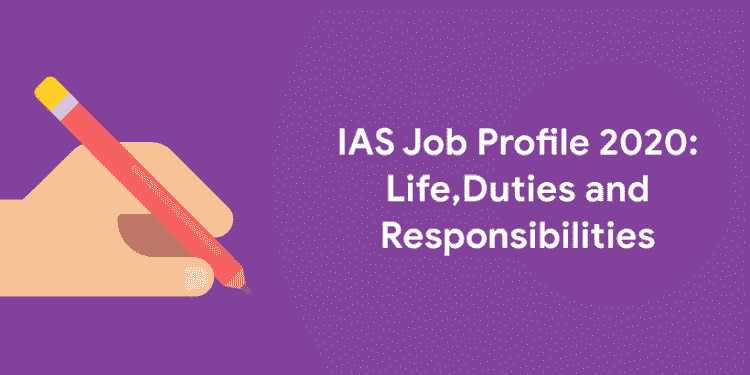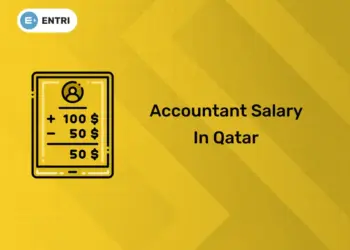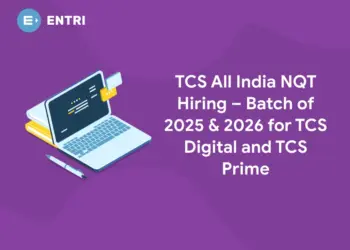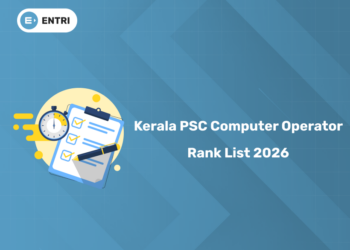Table of Contents
The Indian Administrative Service (IAS) is a branch of the Indian Civil Service. It is one of the premier services of Government of India. After qualifying the mandatory entrance exams, one becomes an IAS officer and gets recruitment in the government set up. IAS is one of the prestigious and popular career choices among many aspirants preferring to make a career in the government sector. In this blog we will discuss about IAS Job Profile 2020: Life,Duties and Responsibilities.
What makes it a popular career choice is the fact that along with monetary compensation, the job of an IAS officer offers several perks and privileges that no other job can offer. The role of an IAS officer is to manage various administrative matters of the government. The job of an IAS officer includes framing policies and advising the ministers on various issues, maintaining of law and order, supervising the implementation of policies of State Government and Central Government, collecting revenues and function as courts in revenue matters, supervising expenditure of public funds as per norms of financial propriety and handling the daily affairs of the government, including framing and implementation of policy in consultation with the minister responsible for the department concerned.
Click here to practice sectional Mock Test for various competitive exams!
IAS Job Profile 2020: Eligibility Criteria
Getting into Indian Administrative Service and becoming an IAS officer is not easy as there is a lot of competition involved, however, one with a right attitude and approach can become an IAS officer. For becoming an IAS officer, a candidate must qualify UPSC civil services exam (UPSC CSE) that consists of three stages – Prelims, Mains, and Interview.
Below are the academic qualifications required for becoming an IAS officer.
Subject Combination– Candidates can choose any stream in XII.
Exam – UPSC Civil Services Exam (UPSC CSE)
Eligibility–
- Candidates must hold a Bachelor’s degree in any stream from any recognized university.
- Candidates who have appeared for the final examination and are awaiting results can also apply for the Preliminary Examination. However, one must produce a proof of passing a bachelor degree to appear for the civil services Main exam. The degree has to be attached with the application for the Main exam.
- Candidates having professional and technical qualifications recognized by the Government or its equivalent are also eligible to apply for IAS exam.
- The minimum age required to appear for the IAS exam is 21 years.
IAS Job Profile 2020: Daily life of an IAS officer
1: Who was the first woman President of India?
Candidates who successfully clear the UPSC Civil Services Exam get the first taste of life as an IAS officer as soon as they join the Lal Bahadur Shastri National Academy of Administration (LBSNAA). The day to day life of an IAS officer during training is very disciplined and starts at 6 am sharp. The following is the schedule usually followed at LBSNAA:
- 6 am: Morning exercise/horse riding training for 60 minutes
- 7 am to 9 am: Free time for morning activities
- 9:30 am onwards: 8-10 hours of academic activity including lectures, sports and extracurricular activities.
Officer trainees are left free before and after dinner to socialise and prepare for the next day. Outdoor activities such as treks to nearby rural areas to learn to cope with adversity and understand the lifestyle of rural India are an integral part of the training. The training of IAS officers also includes Bharat Darshan (a study tour of India).
Once a trainee graduates as an IAS officer, their schedule changes according to their allotted post. A typical day for an officer posted in the field would begin at 9 am and would involve going through various daily reports, supervising various daily tasks of the department or district, visiting different areas to review the implementation of developmental activities and meetings.
These activities can stretch into the late evening and usually end by about 9 pm.
During emergencies such as natural disasters, riots etc. an IAS officer might put in continuous work coordinating response and relief teams well beyond normal duty hours.
Ace your Preparation for Competitive Exams!
IAS Officer Life – Responsibilities
IAS officers’ functional roles depend on the type of assignment they get. There are three types of assignments given to them:
- Field
- State Secretariat/Public Sector Undertakings
- Central Secretariat
The field assignments are considered the toughest roles that an IAS officer may be called upon to fulfill. The following are the basic functions of the Civil Services:
- Handling affairs of the government, including framing, implementing and reviewing policies.
- Consulting with various departments and elected representatives for the above functions.
- Management and disbursement of various funds of the central government allocated for different schemes.
- Supervising the implementation of various schemes and policies of the government.
- Responding to emergencies such as natural disasters, major accidents and riots in their jurisdiction and coordinating relief activities.
The assignment specific roles that civil servants perform are discussed below:
- Field Assignments: An IAS officers’ first posting after training is usually a field assignment. The various levels where they work have their own complexities.
- Sub Divisional Functions: As a Sub Divisional Magistrate, maintenance of law and order, overseeing developmental and administrative activities within the Sub -Division.
- District Level Functions: As a District Magistrate, Collector or Deputy Commissioner, perform the same functions as an SDM at the district level and also supervise SDMs in their role.
Field assignments usually end at the district level for most IAS officers. Many of them move to positions within the state government and work in the State Secretariat.
- State Secretariat Assignments: State Secretariat postings involve using the experience and expertise gained in the field to advise elected representatives formulate policies and make decisions regarding government processes.
- Public Sector Undertakings: Many officers get posted to PSU cadres on deputation and become part of the higher management of various Public Sector Undertakings such as power stations, industrial units etc.
- Central Secretariat Assignments: Secretarial level postings at the level of the Central government deal with policy review, formulation and implementation for different ministries.
Many IAS officers are also deputed to international bodies such as the United Nations. There are provisions to depute IAS officers to private organizations for short tenures as well.
Free UPSKILLING Courses!
Take your first step toward mastering in-demand skills, acing interviews, and securing top-tier jobs with Entri's free upskilling courses.
Start Learning!IAS Officer: List of Powers
- As per the Code of Criminal Procedure (1973) of the Indian Penal Code: Sections 107,108,109,110,133,144 and 176 lists out powers for maintaining law and order given to Magistrates
- Tenancy Laws define the powers of a collector regarding revenue
- National Disaster Management Act list out powers of Chief Secretaries and Magistrates while directing disaster relief operations.
- Arms Act, Drug Licenses Act, Essential Commodities Act etc. list out IAS officers’ power to enforce regulations in different situations.
These are the main laws that deal with powers of IAS, though there are close to 300 laws that define them on a case to case basis. These rules are also provided in an abridged form in the All India Service Manuals which are updated from time to time by the Department of Personnel and Training. The service manuals also list out the IAS conduct rules. All civil servants are answerable to state and central legislatures.
IAS officer – Career Path
The following is the career path that most IAS officers take. The career paths diverge after probation depending on the allotted cadre.
- Phase I Training at LBSNAA
- Training at the district level in the allotted cadre
- Phase II Training at LBSNAA which includes a week-long foreign attachment with one of India’s diplomatic missions abroad
- Central Government attachment at the nominal position of an Assistant Secretary for three months
- Posting as SDM/Joint Magistrate/Sub Collector
- Posting as Municipal Commissioner, DDO/CDO
- Posting as DM/Collector
- Posting at State Secretariats at Director/Joint Secretary level.
- Deputation to the Central Government can be opted for during any stage of service after serving for a few years.
- Principal/Additional Secretary in the State Secretariat/Central Secretariat
- Chief Secretary of a state
- Cabinet Secretary
The highest position an IAS officer can aspire to is the position of the Cabinet Secretary of India. In-state bureaucracy, Chief Secretary of states is the highest one can go.
IAS Officer- Salary
The 7th Central Pay Commission has stipulated a basic pay of Rs 56100 for newly inducted IAS officers. There are a total of 18 pay levels for IAS with the Cabinet Secretary of the Union getting the highest pay at Rs. 250000. In addition to this, IAS officers usually get the following perks while in service:
- Subsidised government accommodation. District level postings get the best houses among any government service in India.
- Household help such as cooks, gardeners etc. depending on the requirement.
- Security cover depending on the requirement.
- Government transportation is provided in the most district and state-level postings. Central deputations have less vehicular facilities extended to IAS and only officers above a certain rank get government vehicles.
- Mobile, internet and telephone charges are reimbursed.
- Free stay in government rest houses and bungalows during the course of duty.
- IAS officers are also entitled to a monthly pension after retirement based on their rank and length of service.
The Indian Administrative Service (IAS) also allows officers to proceed on paid study leave for up to two years to study at any reputed university in India and abroad.
The life of an IAS officer is both challenging and satisfying for a driven individual. It is the perfect opportunity for youngsters to directly participate in the administration and development of their country.
TN Seshan, the man who cleaned up India’s elections, was one of the IAS toppers in 1955. As the Chief Election Commissioner, he implemented a variety of reforms in the electoral process in India that earned him the ire of many politicians but also endeared him to the people of this country. Another civil servant who brought about a major transformation in the country is E Sreedharan, India’s ‘Metro Man’. Sreedharan, a Padma Vibhushan awardee, was responsible for the timely execution of the Delhi Metro project. He was known for boldly side-lining political pressure and circumventing political interventions for speedy execution of projects.
There are remote hamlets in our country even today where the most basic needs are lacking and people’s lives are miserable. Imagine being responsible for bringing drinking water, transportation facilities, health facilities, educational institutions, sanitation, nutrition and dignity into the lives of people in such places.
You too can become an IAS officer and do your bit to make a positive change in peoples’ lives. Even though it is generally opined that the IAS exam is really tough and only a few brilliant people can clear it, the fact is, the IAS exam can be cracked by anyone who puts in diligent lab our. The only requirement is to understand the demands of the exam perfectly and study accordingly, and this is where guidance from experienced people matter. Taking help from experts in the field will boost a candidate’s chances of cracking the IAS exam in the first attempt itself.
Why Practice from Entri?
- Always provides you up to date materials that are created by Entri’s Top Experts.
- Mock tests available in bilingual and other regional languages
- Download Entri to access the unlimited mock test.
Navigating through Entri
- Open your Entri App go to the UPSC Tab and check the mock tests.
- You can check courses and Mock test for other examinations as well
- Subscribe to our Mock Test and clear your examination with flying colors.
Ace your preparation. That is where Entri comes in. It helps you to prepare effectively for your Exam.
That will be all from our end at Entri, hope you have benefited from our mock tests and study materials. Entri wishes you all the best for your upcoming examinations. Start your Preparation today itself.










